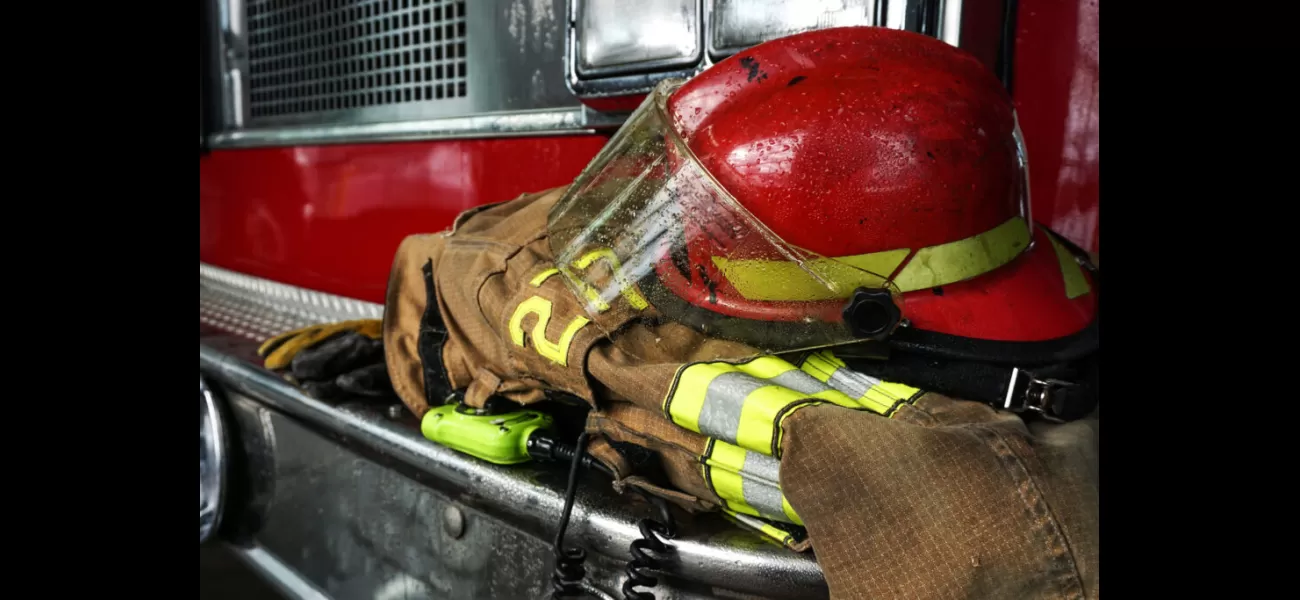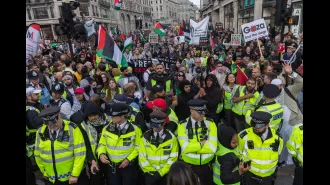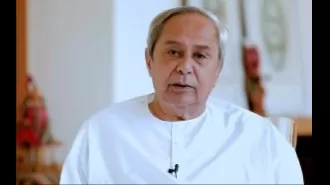Chicago's black firefighters demand justice in celebration of MLK Day.
Black firefighters in Chicago hold press conference on MLK Day to address their grievances and draw parallels to Dr. King's fight against inequality.
January 20th 2024.

On Martin Luther King Day, Black firefighters in Chicago took advantage of the day to bring attention to their ongoing struggle for promotions that have been denied to them. Known as the "Lewis Class," this group consists of 117 Black firefighters in the city who have been fighting for their rights since the Lewis v. City of Chicago lawsuit in 2005. This lawsuit found that the city had violated the Civil Rights Act of 1964 due to discriminatory hiring practices. The Lewis Class is now reigniting the fight that was started by their namesake.
Former firefighter Michael Taqee shared his personal experience with the Chicago Tribune, stating that an admissions practice from the 1990s had a negative impact on his chances of getting a promotion. He was eventually forced to retire by the city, feeling like it was a race he would never win. Taqee explained, "I knew that I would never be given the opportunity to be promoted, so I decided to leave early. I wanted to chase my dreams before I got too old to chase them."
On January 15, Taqee and other members of the Lewis Class held a press conference to discuss their grievances and tie Dr. King's fight against inequality to their own. Rodney Shelton, an engineer for the Chicago Fire Department, spoke at the conference, saying, "From my perspective on King, he fought for civil rights. This was a civil rights case, and even with what we thought was a great outcome, you still have hills and valleys." Shelton added, "People fought for us, and now we're going to continue that fight."
Attorney Chiquita Hall-Jackson, who is representing the firefighters, shared that the first Black firefighter in the Lewis Class was promoted to the rank of lieutenant in August. However, there is still a significant disparity in promotions between the Lewis Class and other academy classes of Black firefighters. Hall-Jackson stated, "That's why we're here, and that's why the harm has been shown. Exams have been taken, and these individuals have been harmed because they didn't receive the seniority points they were entitled to."
The main focus of the firefighters' motion is the use of seniority in promotion tests. Because some of the firefighters were excluded from being hired in the 1990s, it is challenging for them to overcome the 30% weight given to seniority and be promoted to higher ranks. In 1995, over 26,000 applicants took a written exam to become firefighters, but only a few hundred jobs were available. The city then decided to cut those who scored an 88 or below, leading to a process that discriminated against Black and other minority applicants.
In 2005, U.S. District Judge Joan Gottschall ruled that this test had created a "disparate impact" and that the city had not justified the cut-off score. While the city agreed with the ruling, they argued that it was necessary due to the high number of applicants. The city did not appeal the ruling, but they claimed that the firefighters had waited too long to bring the suit. However, in 2010, the Supreme Court disagreed with this argument.
Shelton believes that their case is a continuation of the earlier one. He stated, "This is a continuation of a case that started in 1998. We saw it firsthand after we took our first promotion exam." Attorney Hall-Jackson also sees this case as a matter of justice for her clients. She said, "These firefighters will never have the opportunity to be promoted before they age out of the department. They are asking for justice in terms of their seniority, pay, and ability to be promoted in the workplace."
According to Hall-Jackson, the city has until January 31 to respond to the filing from November. In related news, Long Island Fire Department recently welcomed its first Black Fire Commissioner. This is a positive step towards diversity and inclusion in the fire department. The fight for justice continues for Black firefighters in Chicago and across the nation.
Former firefighter Michael Taqee shared his personal experience with the Chicago Tribune, stating that an admissions practice from the 1990s had a negative impact on his chances of getting a promotion. He was eventually forced to retire by the city, feeling like it was a race he would never win. Taqee explained, "I knew that I would never be given the opportunity to be promoted, so I decided to leave early. I wanted to chase my dreams before I got too old to chase them."
On January 15, Taqee and other members of the Lewis Class held a press conference to discuss their grievances and tie Dr. King's fight against inequality to their own. Rodney Shelton, an engineer for the Chicago Fire Department, spoke at the conference, saying, "From my perspective on King, he fought for civil rights. This was a civil rights case, and even with what we thought was a great outcome, you still have hills and valleys." Shelton added, "People fought for us, and now we're going to continue that fight."
Attorney Chiquita Hall-Jackson, who is representing the firefighters, shared that the first Black firefighter in the Lewis Class was promoted to the rank of lieutenant in August. However, there is still a significant disparity in promotions between the Lewis Class and other academy classes of Black firefighters. Hall-Jackson stated, "That's why we're here, and that's why the harm has been shown. Exams have been taken, and these individuals have been harmed because they didn't receive the seniority points they were entitled to."
The main focus of the firefighters' motion is the use of seniority in promotion tests. Because some of the firefighters were excluded from being hired in the 1990s, it is challenging for them to overcome the 30% weight given to seniority and be promoted to higher ranks. In 1995, over 26,000 applicants took a written exam to become firefighters, but only a few hundred jobs were available. The city then decided to cut those who scored an 88 or below, leading to a process that discriminated against Black and other minority applicants.
In 2005, U.S. District Judge Joan Gottschall ruled that this test had created a "disparate impact" and that the city had not justified the cut-off score. While the city agreed with the ruling, they argued that it was necessary due to the high number of applicants. The city did not appeal the ruling, but they claimed that the firefighters had waited too long to bring the suit. However, in 2010, the Supreme Court disagreed with this argument.
Shelton believes that their case is a continuation of the earlier one. He stated, "This is a continuation of a case that started in 1998. We saw it firsthand after we took our first promotion exam." Attorney Hall-Jackson also sees this case as a matter of justice for her clients. She said, "These firefighters will never have the opportunity to be promoted before they age out of the department. They are asking for justice in terms of their seniority, pay, and ability to be promoted in the workplace."
According to Hall-Jackson, the city has until January 31 to respond to the filing from November. In related news, Long Island Fire Department recently welcomed its first Black Fire Commissioner. This is a positive step towards diversity and inclusion in the fire department. The fight for justice continues for Black firefighters in Chicago and across the nation.
[This article has been trending online recently and has been generated with AI. Your feed is customized.]
[Generative AI is experimental.]
0
0
Submit Comment





